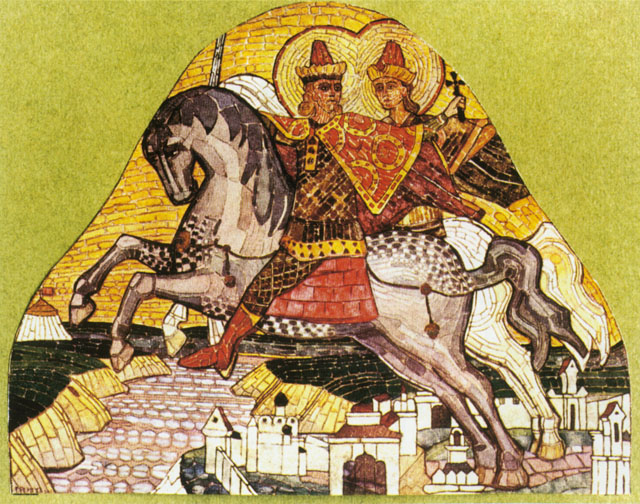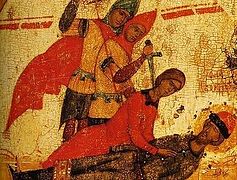The holy Orthodox Church honored the memory of the holy Right-Believing Princes and Passion-Bearers Boris and Gleb yesterday, July 24/August 6.
Many people, including some churched Orthodox people, are perplexed as to why the Church counts Boris and Gleb, the sons of Prince Vladimir, among the choir of saints. What is their Christian podvig? They were not pressured to renounce Christ. The reason for their martyrdom was not their confession of faith, but rather the role of the Princes in public life. Why then are they considered Holy? Is it simply because they meekly allowed themselves to be killed?
Let us remember their life and the story of their death.
The Princes Boris and Gleb (Roman and David in Baptism) were the younger sons of the Equal-to-the-Apostles Prince Vladimir. The brothers were born not long before the Baptism of Rus’ and were therefore raised in the Christian Faith.
When their father, Prince Vladimir, died, his eldest son Svyatopolk, who was in Kiev at that time, declared himself Grand Prince of Kiev. At that time, Prince Boris returned from a campaign, and his retinue urged him to go to Kiev and take the Grand-Princely Throne. Boris, not wanting to incite civil strife, dismissed his army, saying, “I will not raise my hand against my brother, moreover my older brother, whom I should consider like a father!”
Regardless, Svyatopolk decided to rid himself of the [perceived—Trans.] rival to the princely throne, and he sent assassins for Boris. Boris knew about the danger, but he did not resist. On July 24, 1015, Boris was murdered in his tent, on the bank of the Alta River, after the Sunday Church service.
After that, Svyatopolk also treacherously assassinated Prince Gleb. Cunningly calling his brother out of his inheritance—Murom, he sent him towards the vigilantes, so they could kill Gleb on the road. Prince Gleb already knew about the death of his father, and the assassination of Prince Boris; however, deeply sorrowed, he preferred death rather than a war with his brother.
In 1019, the Prince of Kiev, Yaroslav the Wise, also one of the sons of the Equal-to-the-Apostles Prince Vladimir, assembled an army and defeated the army of Svyatopolk. The latter, called “the Accursed” by the Rus’ people, he fled to Poland, where like the first fratricide Cain, he found neither rest nor shelter.
After the tragic deaths of Boris and Gleb, as the chroniclers testify, “revolt was pacified in Rus,’” and internecine wars ceased in Rus’ for a long time.
What conclusions can we draw for ourselves from the lives of Boris and Gleb?
1. The Divine Grace received by Prince Vladimir during his personal Baptism, and the Baptism of Rus’ completely changed both his own psyche, and henceforth, that of the rulers of Russia. After all, in those days (and not only in Rus’), committing the most terrible crimes for the sake of power was practically the norm. The behavior of the Princes Boris and Gleb, who sacrificed their lives to prevent a civil war was absolutely not typical even for Christian Europe, let alone Rus’, which not long before was pagan.
2. Formally, Boris and Gleb did not suffer for the name of Christ, but rather for his words: If a man say, I love God, and hateth his brother, he is a liar (1 Jn. 4:20).
When Svyatopolk arbitrarily occupied the throne of Kiev, Boris’ retinue suggested he march on Kiev, but he refused, because he did not want to spill the blood of his brother and of other Russian people. Boris and Gleb were warned about the coming evils, but they humbly accepted death, following the example of the Savior.
Here are the words of Boris: “If he (Svyatopolk) sheds my blood and decides to murder me, I will be a martyr before my Lord. I will not resist, for as it is written, God resists the proud, but gives grace to the humble.” Boris, and later Gleb, did not want to shed his brother’s blood for the sake of earthly glory and power. Both of them consciously came to the decision to become like Christ, and to learn from His meekness and humility, and to find rest in eternity.
3. Boris and Gleb are also examples of rulers who choose not to send their nations into a fratricidal war, although they knew that they would receive death for this choice.
The Holy Passion-Bearers Boris and Gleb are the first canonized saints of the Russian Church. Even in ancient times, their deaths were compared with the death of the righteous Abel at the hand of his brother Cain. The humility and meekness of the brothers always arouses reverence among all generations who inhabit our land. Let us pray to them!





